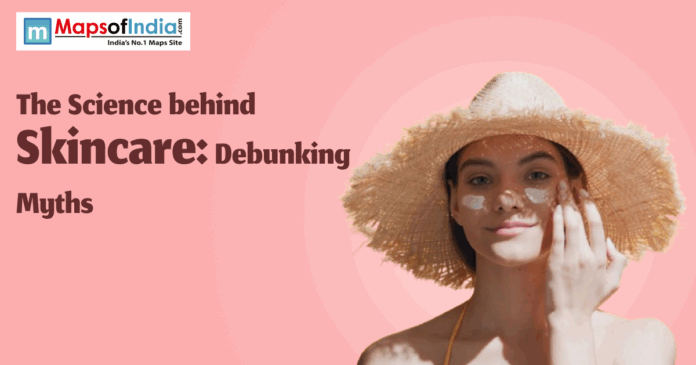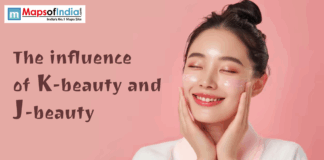Taking care of your skin is an important thing for everyone. Following a daily skincare routine is a daily ritual for many. Following this ritual daily promises users a healthier and glowing skin. But there are still some myths surrounding skincare products and routines. In recent years, the skincare market has become a $189 billion industry. According to the Grand View Research report projects a 5.3% CAGR through 2030. Those who follow the skincare routine spend $50 monthly on average on those products. According to the recent Statista survey, 70% consumers buy the product based on trends. Science can help to debunk common misconceptions around skincare. Understanding skin biology clarifies facts.
Skin Biology: The Foundation of Effective Care
Skin is the largest organ in the human body. Skin weighs 16% of body weight and is renewed every 28 days. According to the Britannica article, the epidermis protects against pathogens. The dermis gives structure with collagen. Subcutaneous fat insulates. According to the Journal of Investigative Dermatology study, skin turnover becomes slower with age. When you reach the age of 50, it will take 45 days. pH level is 4.5 to 5.5 for barrier health. According to the recent Healthline report, alkaline products disrupt this. Hydration is an important aspect for good skin. The stratum corneum can hold up to 30% water. According to the Dermatology Times article notes moisturisers lock it in. According to the American Academy of Dermatology, exposure to UV rays can cause 80% of ageing. According to skin science, skincare needs balance. Choose the products according to your skin type. Not all products suit every skin type.
Myth 1: Expensive Products Are Always Better
A higher price doesn’t guarantee efficacy. Users believe that buying an expensive product can lead to good skin, but it’s not always the case. These luxury creams most of the time use the same ingredients as the cheap ones. A recent article published in Harvard Health debunks this myth. According to this article, high prices reflect branding, not science. Retinol in $10 serums works the same way as in $100 versions. A recent study in the Journal of Cosmetic Dermatology found no difference in wrinkle reduction. Clinical evidence is essential. A PURE Medical Spa report says effective products have proven actives. Many consumers waste $100 yearly on the hype of the products. A recent Statista survey shows 60% of users prioritise price over evidence. Look for concentrations in this product. 0.5% retinol is enough to get a result. Using high doses can cause irritation to the skin. Science favours formulation over cost. Affordable options can also deliver results.
Myth 2: Natural Ingredients Are Always Safe
These myths are really famous among people. They believe that Natural means risk-free. But that’s not always the case. Essential oils can irritate your skin. According to the recent Dermatology South FL article, tea tree oil can cause 5% allergic reactions. Various kinds of plants contain allergens and toxins. A recent study by Rosafa Skincare found that 20% of “natural” products contain irritants. Synthetic ingredients undergo various kinds of testing. In many cases, we can see that lab-made compounds are safer. Parabens, once vilified, preserve effectively. A Cellsound Aesthetics report says they prevent 90% bacterial growth. Natural products lack regulation. A Bellaire Dermatology article notes that 30% have unknown allergens. Science prioritises test-based evidence over any brand’s label. Balanced skincare routines work best.
Myth 3: Sunscreen Is Only Needed on Sunny Days
It’s a simple scientific fact that UV rays can penetrate clouds. These rays can cause 80% of skin ageing. A DCSI Dermatology article debunks this. UVA can pass through windows and clouds and reach your skin. According to the recent Cole Dermatology report 90% of UV damage is UVA. According to the Rosafa Skincare study, the daily use of sunscreen can reduce melanoma risk by 50%. Broad-spectrum SPF 30 blocks 97% UVB. According to the in-cosmetics report, the product should be reapplied every 2 hours. Even though you are indoors, you need to use it. According to the PURE Medical Spa article, 20% of skin damage can be caused by indoor UV. Choose mineral sunscreens if your skin is sensitive. Science shows consistent protection is a key.
Myth 4: Oily Skin Doesn’t Need Moisturiser
Oil on the skin does not mean your skin is moisturised. Oily skin also needs proper hydration. Overproduction of oil in your body occurs when the skin is dry. A Kim Gallo Aesthetics article says moisturisers balance sebum by 30%. Non-comedogenic formulas prevent breakouts. A recent study by Bellaire Dermatology found that users have 40% less acne if they do proper moisturising. Sunscreen of Lightweight gels is suitable for oily skin types. Some dermatologists also recommend hyaluronic acid. It can hold 1000 times its weight in water. A recent ScienceAlert article says it plumps skin without greasiness. Myths lead to stripped barriers. 25% of users experienced irritation when they skipped moisturising. A dermatologist suggests using moisturisers on a daily basis. Oily skin can benefit from balance.
Myth 5: Exfoliating More Is Better
The Daily exfoliation is good is one of the dangerous myths. This can damage your skin. It can strip the barrier that is leading to inflammation. A recent Cole Dermatology article says doing it 2 to 3 times a week is ideal. Over-exfoliation can make your skin 30% more sensitive. A Bellaire Dermatology study found micro-tears from acids. Gentle methods like enzymes are safer for the skin. A PURE Medical Spa report recommends using AHAs for dead cells. BHA is suitable for pores on the skin. A ScienceAlert article says pH 3.5 to 4 maximises efficacy. Skin also needs time to recover. A recent Rosafa Skincare study notes that 20% of the skin’s barrier repair occurs in 48 hours. Exfoliate based on skin type.
Myth 6: Collagen Supplements Reverse Ageing
Humans are designed to age, and there is no medicine for reversing ageing. Collagen pills don’t penetrate skin effectively. Topical treatments work better for this. A Dermatology South FL article debunks this. Taking oral collagen breaks down in digestion. According to the Rosafa Skincare study, there was no significant wrinkle reduction due to using this. Topical serums with peptides can boost collagen by 15%. A recent in-cosmetics report says hydrolysed collagen absorbs 90% topically. According to the Kim Gallo Aesthetics article, having proper diet sources like bone broth is superior. Scientific research supports retinol and vitamin C for 20% firmness improvement. Supplements can be helpful for joints, but not skin. Focus on proven activities.





